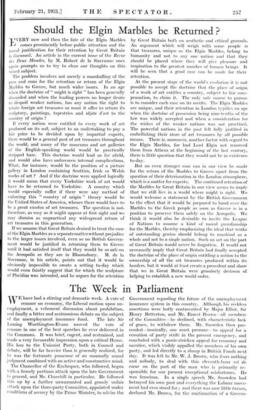Should the Elgin Marbles be Returned ?
'LIVERY now and then the fate of the Elgin Marbles. 1j comes prominently before public attention and the moral justification for their retention by Great Britain is discussed. An article in the current issue of the Revue des Deux -Mondes, by M. Robert de la Sizeranne. once again prompts us to try to clear our thoughts on this, vexed subject.
The problem involves not merely a marshalling of the pros and cons for the retention or return of the Elgin Marbles to Greece, but much wider issues. In an age when the doctrine of " might is right " has been generally discarded and when the leading powers no longer desire to despoil weaker nations, has any nation the right to retain foreign art treasures or must it offer to return its seulptury, paintings, tapestries and objets d'art to the country of origin ?
If every nation were entitled to every work of art produced on its soil, subject to an undertaking to pay a fair price to be decided upon by impartial experts, there would be a general post of art treasures throughout the world, and many of the museums and art galleries of the English-speaking world would be practically stripped bare. This doctrine would lead us far afield, and would also have unforeseen internal complications. What, for instance, would be the position of a picture gallery in London containing Scottisn, Irish or Welsh works of art ? And if the doctrine were applied logically it would mean that every Yorkshire work of art would have to . be returned to Yorkshire. A country which would especially suffer if there were any method of enforcing this " country of origin " theory would be the United States of America, whence there would have to be a great exodus of art treasures. The question is not, therefore, as easy as it might appear at first sight and we may dismiss as unpractical any widespread return of art treasures in this generation.
If we assume that Great Britain desired to treat the case of the Elgin Marbles as a separate mattcrwithout prejudice to the larger issues involved, even so no British Govern- ment would be justified in returning them to Greece until it had satisfied itself that they would be as safe on the Acropolis as they are in Bloomsbury. M. de la Sizeranne, in his article, points out that it would be obviously impossible to create a setting to-day which would even faintly suggest that for which the sculpture of Pheidias was intended, and he argues for the retention by Great Britain both on aesthetic and ethical grounds. An argument which will weigh with some people is that treasures, unique as the Elgin Marbles, belong to humanity and not to any one nation and that they should be placed where they will give pleasure and inspiration to the greatest number of human beings. It will be seen that a good case can be made for their retention.
At the present stage of the world's evolution it is not possible to accept the doctrine that the place of origin of a work of art entitles a country, subject to fair com- pensation, to claim it. The only safe course to pursue is to consider each case on its merits. The Elgin Marbles are unique, and their retention in London typifies an age when the doctrine of possession being nine-tenths of the law was widely accepted and when a consideration for the wishes. of the weaker nations was not practised. The powerful nations in the past felt fully justified in embellishing their store of art treasures by all possible means. There is, moreover, another factor with regard to the Elgin Marbles, for had Lord Elgin not removed them from Athens at the beginning of the last century, there is little question that they would not be in existence to-day.
But an even stronger case can in our view be made for the return of the Marbles to Greece apart from the question of their deterioration in the London atmosphere, which is a matter for experts. The continued retention of the Marbles by Great Britain in our view seems to imply that we still live in a world where might is right. We would welcome a statement by the British Government to the effect that it would be prepared to hand over the Marbles to the Greek people as soon as Greece is in a position to preserve them safely on the Acropolis. We think it would also be desirable to invite the League of Nations to assume a kind of moral guardianship for the Marbles, thereby emphasizing the ideal that works of outstanding genius should belong to mankind as a whole and not to a single nation. Such an act on the part of Great Britain would never be forgotten. It would not necessarily imply that Great Britain had finally accepted the doctrine of the place of origin entitling a nation to the ownership of all the art treasures produced within its borders, but it would at least create a precedent and show that we in Great Britain were genuinely desirous of helping to establish a new world order.











































 Previous page
Previous page